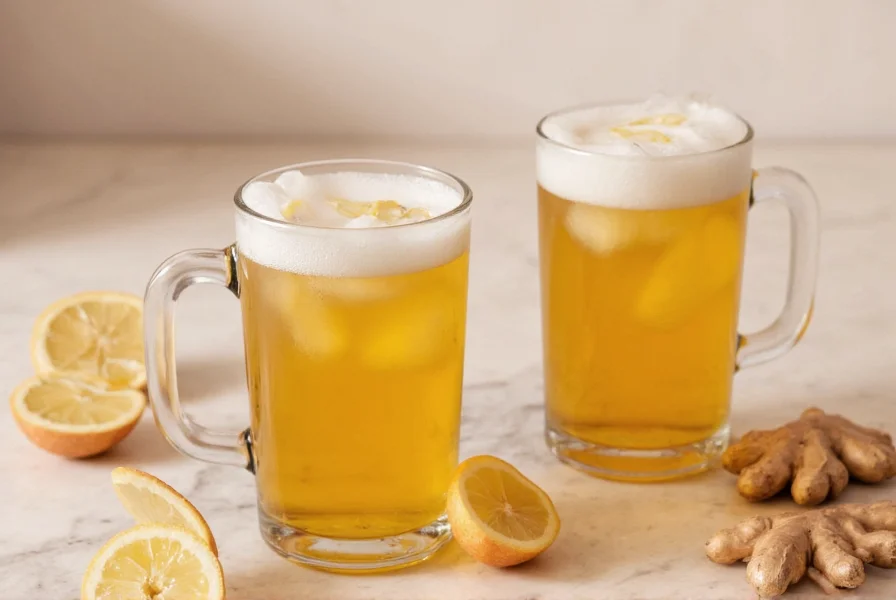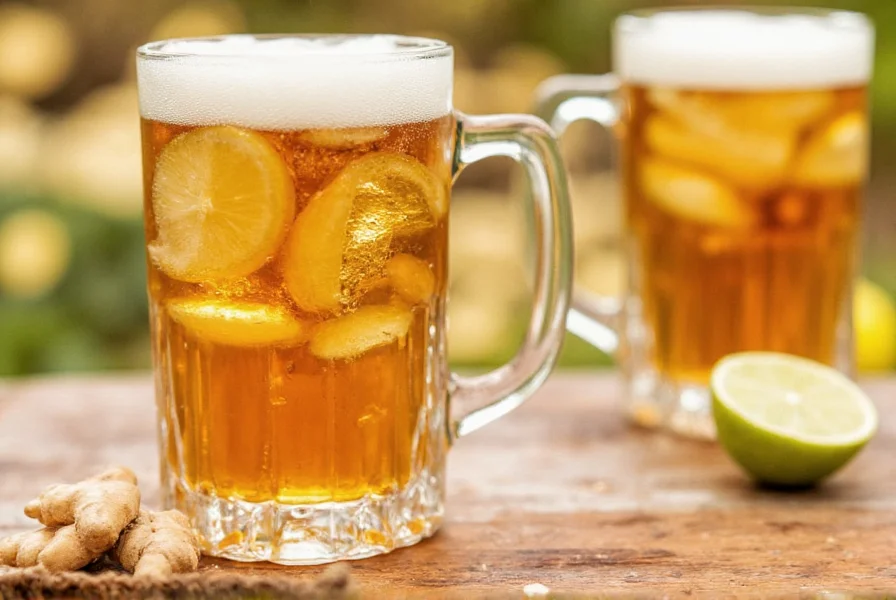When wondering is ginger ale good for you, the answer depends on what you're seeking. Most mainstream ginger ales contain surprisingly little actual ginger—often just flavoring rather than real root extract. While traditionally made with ginger for digestive benefits, modern versions prioritize taste over therapeutic value. The carbonation may soothe an upset stomach temporarily, but the significant sugar content (up to 30g per 12oz can) counteracts potential advantages for most health goals.
What Exactly Is Ginger Ale?
Ginger ale originated in 19th century Ireland as a fermented beverage made from fresh ginger root, sugar, and water. Today's commercial versions differ significantly. Most mass-produced ginger ales use artificial ginger flavoring rather than real ginger extract. The beverage falls into two main categories:
| Type | Ginger Content | Sugar Content | Best For |
|---|---|---|---|
| Dry/Golden Ginger Ale | Higher (real ginger extract) | Moderate (20-25g/12oz) | Therapeutic benefits |
| Bright/Regular Ginger Ale | Low (artificial flavoring) | High (30g+/12oz) | Taste preference |
The Ginger Content Reality Check
Research shows most popular ginger ale brands contain less than 0.5% actual ginger root extract. A 2022 analysis of leading brands found:
- Canada Dry: Contains "natural ginger flavor" but no measurable ginger compounds
- Seagram's: Similar artificial flavoring with negligible ginger content
- Fever-Tree: Uses real ginger extract (1.2g per 12oz)
- Reed's: Contains 2.5g fresh ginger per 12oz serving
For meaningful ginger benefits, you'd need products specifically labeled as containing "real ginger extract" or "fresh ginger" in the ingredients list. The term "ginger flavor" typically indicates artificial compounds rather than actual ginger.
Potential Health Benefits: Separating Fact From Folklore
Ginger itself has well-documented benefits, but ginger ale's effectiveness depends on its actual ginger content. Research published in the Journal of Ethnopharmacology confirms ginger's effectiveness for:
- Nausea relief (particularly morning sickness and motion sickness)
- Digestive support through increased gastric motility
- Mild anti-inflammatory effects
- Antioxidant properties
However, most commercial ginger ales contain insufficient ginger to deliver these benefits. The carbonation may provide temporary relief for an upset stomach through burping, but this isn't unique to ginger ale—any carbonated beverage could offer similar relief.
Health Considerations and Drawbacks
When evaluating is ginger ale healthy for daily consumption, several factors warrant consideration:
Sugar Content Concerns
A standard 12-ounce can of ginger ale typically contains 30-40 grams of sugar—equivalent to 7-10 teaspoons. Regular consumption contributes to:
- Increased risk of type 2 diabetes
- Weight gain and obesity
- Dental erosion and cavities
- Blood sugar spikes and crashes
Artificial Ingredients
Many brands include:
- High fructose corn syrup
- Artificial colors (like caramel color)
- Sodium benzoate (a preservative)
- Synthetic ginger flavor
These ingredients provide no nutritional value and may cause sensitivities in some individuals.
When Ginger Ale Might Actually Help
Certain situations where ginger ale could provide genuine benefit:
- Mild nausea relief: The carbonation helps settle the stomach, and even small ginger amounts may provide some anti-nausea effects
- Rehydration during illness: When combined with oral rehydration solutions for mild dehydration
- Digestive support after heavy meals: Particularly versions with real ginger content
For maximum effectiveness during nausea, choose "dry" or "golden" ginger ale varieties that specifically list ginger root extract as an ingredient. Avoid extremely cold versions, as room temperature ginger ale works better for settling the stomach.

Better Alternatives for Ginger Benefits
If you're seeking the health benefits of ginger without the drawbacks of commercial ginger ale, consider these superior options:
- Fresh ginger tea: Steep 1-2 inches of fresh ginger root in hot water for 10 minutes
- Ginger shots: 1-2 ounces of pure ginger juice (often available at juice bars)
- Homemade ginger ale: Ferment fresh ginger, sugar, and water for natural carbonation
- Ginger supplements: Standardized extracts providing consistent dosing
These alternatives deliver significantly higher ginger concentrations without excessive sugar. A typical ginger tea contains 1-2 grams of fresh ginger per cup—substantially more than most commercial ginger ales provide in an entire serving.
Choosing the Best Ginger Ale Option
If you prefer ginger ale specifically, follow these guidelines to select the healthiest option:
- Check the ingredient list for "ginger root extract" or "fresh ginger" near the beginning
- Avoid products listing "natural flavors" as the primary ginger source
- Choose brands with lower sugar content (under 20g per 12oz)
- Consider "diet" versions with natural sweeteners if reducing sugar is important
- Look for organic options to avoid artificial colors and preservatives
Brands like Fever-Tree, Q Mixers, and Reed's generally contain more actual ginger than mainstream options. For therapeutic purposes, however, these still don't match the potency of fresh ginger preparations.

The Bottom Line on Ginger Ale and Health
Is ginger ale good for you? The answer requires nuance. As a natural remedy for nausea, certain ginger ale varieties can provide mild relief through both carbonation and small ginger amounts. However, for meaningful health benefits, commercial ginger ale generally falls short due to low ginger content and high sugar levels.
For occasional consumption when seeking mild digestive relief, ginger ale poses minimal risk for most people. But if you're looking for ginger's therapeutic benefits, fresh preparations or quality supplements deliver significantly more value without the sugar burden. Understanding the difference between ginger ale as a beverage versus ginger as a medicinal herb helps make informed choices about when (and which) ginger ale might actually serve your health goals.










 浙公网安备
33010002000092号
浙公网安备
33010002000092号 浙B2-20120091-4
浙B2-20120091-4